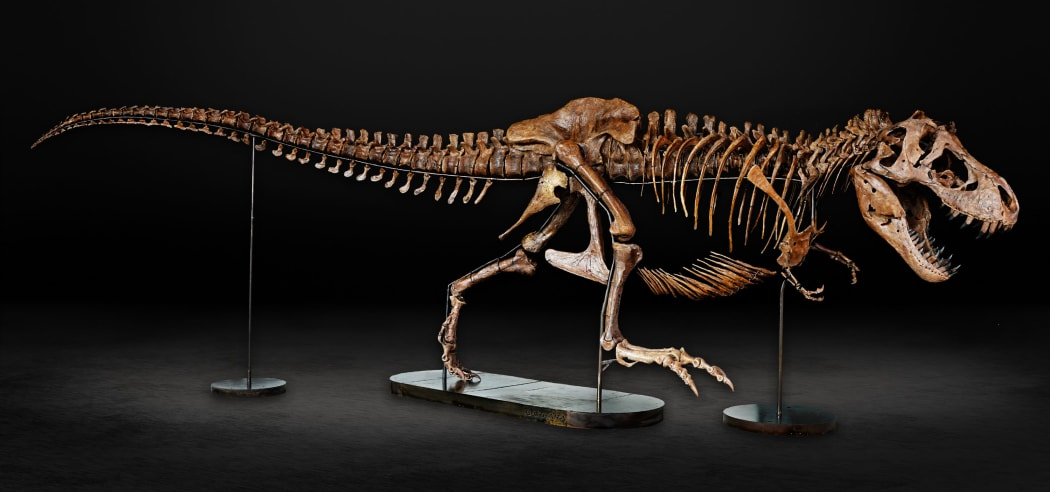The T. rex fossil trade has emerged as a controversial topic in the realm of paleontology, highlighting the intersection of science and commercial interests. This iconic dinosaur, once the apex predator of its time, now finds its fossils being sold for astronomical amounts in luxury fossil auctions, attracting both collectors and investors alike. Unfortunately, the prevalence of commercial fossil collecting has resulted in a significant number of T. rex fossils being hoarded away in private hands, limiting scientific access and stunting research efforts. Alarmingly, studies reveal that over half of the scientifically valuable T. rex fossils are not held in public museums but rather in private collections, diminishing the potential for future scientific discoveries. As these fossils become increasingly commodified, the question arises: at what cost to our understanding of this magnificent species?
In the fascinating world of paleontological exploration, the trade of T. rex specimens has sparked intense debates about ethical stewardship and scientific integrity. Often referred to as the luxury fossil market, this phenomenon encompasses the buying and selling of fossilized remains, which has transformed certain specimens into coveted collectibles rather than valuable scientific resources. Commercial fossil collecting has reshaped the landscape of paleontological research, creating barriers that prevent scientists from accessing crucial fossils that could shed light on T. rex evolution and behavior. This pursuit for lucrative fossils not only obscures our knowledge of these prehistoric creatures but also raises concerns about the future of paleontological studies. As the value of fossilized remains soars, the delicate balance between scientific inquiry and commercial interests has never been more precarious.
The Rising Trend of Luxury Fossil Trade
The luxury fossil trade has emerged as a contemporary issue for paleontology, with T. rex fossils at its core. This phenomenon has gained traction over the years, particularly after the sale of notable specimens like ‘Sue’ and ‘Stan’. These auctions not only reflect the increasing monetary value of these fossils but also highlight the growing interest of wealthy collectors in acquiring such rare pieces. The allure of owning a T. rex fossil has turned these once scientifically invaluable pieces into status symbols, akin to owning fine art or vintage wine.
However, the implications of the luxury fossil trade are significant. With over half of the scientifically valuable T. rex fossils now in private hands, the accessibility for academic research is drastically reduced. This commercialization poses a serious threat to the continuity of paleontological studies that rely on extensive fossil evidence. The trend of buying and selling fossils at astronomical prices not only excludes public institutions from acquiring these specimens but also raises ethical questions about the preservation of these historical remains for future scientific inquiry.
Impacts of Commercial Fossil Collecting on Scientific Research
Commercial fossil collecting has redefined the landscape of paleontological research. While proponents argue that these collectors are recovering fossils from potential erosion and decay, the reality is that the majority of these specimens end up in private homes or commercial galleries. According to recent studies, only 11% of T. rex fossils discovered commercially are placed in public trusts, limiting the opportunity for scientists to study and understand these incredible creatures. This situation creates a barrier for researchers who need access to these fossils to advance knowledge in the field of paleontology.
Moreover, the trend of publishing peer-reviewed studies based on privately held fossils raises significant concerns. When scientific discoveries are made based on fossils that cannot be publicly accessed, the findings may lack the robust replicability that is critical to scientific integrity. The ramifications are profound, as scientists may present conclusions that cannot be verified by their peers, undermining the foundations of paleontological research. The focus on commercial profit over scientific discovery could very well lead to a regression in our understanding of T. rex and other dinosaur species.
Without access to juvenile and subadult T. rex fossils, questions about their growth patterns and behavioral characteristics may remain forever unanswered. This highlights the importance of balancing commercial interests with the need for accessible research specimens to ensure that our understanding of these magnificent creatures does not fall victim to the insatiable greed of the luxury fossil trade.
The Auction of T. rex Fossils: A Double-Edged Sword
The sale of T. rex fossils at auction houses has become a spectacle, drawing in collectors with the promise of owning a piece of history. The staggering prices fetched by specimens like ‘Stan’ and the recent acquisition of the Stegosaurus ‘Apex’ illustrate a booming market fueled by wealthy bidders. While on the surface, these auctions might seem like an opportunity to promote paleontological interest, they instead highlight the growing divide between science and commerce. Museums often struggle to compete with private collectors who are willing to invest millions in rare fossils, effectively sidelining research institutions that prioritize scientific inquiry over profit.
Furthermore, the excitement surrounding these auction events may overshadow the urgent conversation about the implications of private ownership of scientifically crucial fossils. As T. rex specimens are increasingly reclassified as luxury items, the risk grows that they will not be preserved in a manner that benefits science. The trend raises questions about the ethical considerations surrounding the private sale of fossils and whether they should instead be curated within public museums, ensuring that the treasures of our prehistoric past remain accessible for research and education.
The Problem of Fossil Accessibility and Scientific Value
The issue of fossil accessibility is central to the broader conversation about the value of T. rex remains. When more than half of the known T. rex fossils are kept from public view, the implications for scientific research are dire. Fossils serve as critical historical records that can help paleontologists understand evolutionary processes, behavior, and the environmental conditions in which these dinosaurs thrived. Limiting access to these specimens effectively stifles scientific progress and diminishes the educational potential that comes from public displays.
Moreover, the scarcity of accessible T. rex fossils impacts the ability to conduct vital research on the species’ growth and development. For instance, the lack of juvenile and subadult fossils limits our understanding of T. rex sexual dimorphism and behavior. This scientific knowledge gap grows larger as private ownership of fossils becomes increasingly normalized. If current trends continue, the field of paleontology risks losing touch with the wealth of information that T. rex fossils could provide, effectively sealing them off in a world driven by commerce rather than curiosity and exploration.
Ethical Considerations in Fossil Ownership
The rise of commercial fossil collecting brings about pressing ethical questions regarding fossil ownership. Should fossils, which are remnants of ancient life, be treated as commodities available for the highest bidder? Or should they belong in public trust, where they can serve the purpose of education and scientific advancement? The ongoing privatization of T. rex fossils illustrates a concerning trend in which archaeological heritage is commodified, leading some to argue that fossils have cultural and scientific significance that should transcend their monetary value.
The ethical implications extend to how these fossils are studied and utilized. When research is conducted on privately owned specimens, the scientific community faces the challenge of verifying the conclusions drawn. This situation could lead to a crisis of credibility if substantial findings cannot be reevaluated or replicated. In this regard, the fossil trade intersects detrimentally with paleontological ethics, raising essential questions about responsibility to both science and society.
The Future of T. rex Fossils in a Commercial World
As the market for T. rex fossils continues to grow, the future of these scientifically valuable specimens remains uncertain. The balance between commercial interests and scientific integrity is at a critical juncture, with each high-profile auction exacerbating the challenge of ensuring that fossils benefit science rather than merely serve as luxury items. If the trend continues, we risk witnessing T. rex fossils becoming increasingly rare in institutional collections, potentially leading to a decline in paleontological research.
Looking forward, it is crucial to foster more ethical practices in the fossil trade. Promoting responsible collecting and increasing awareness about the importance of making fossils accessible to researchers could pave the way for a rebirth of scientific inquiry. As collectors recognize the profound implications of their acquisitions, there’s the hope that a shift toward prioritizing scientific value over financial gain can ensure the preservation of T. rex fossils for future generations.
Paleontological Research: The Importance of Collaboration
To address the challenges posed by the luxury fossil trade, collaboration between private collectors, researchers, and institutions is essential. Creating partnerships can lead to scenarios where privately owned fossils can be studied or displayed in public exhibitions, ultimately benefiting both the collectors’ reputations and the scientific community’s understanding of T. rex. These collaborations can take various forms, such as loan agreements that allow temporary access to fossils for research purposes.
Additionally, fostering lines of communication between collectors and museums can encourage better practices regarding the sale and ownership of fossils. By facilitating discussions about the value of public access and shared research opportunities, we can create a more holistic approach to paleontological preservation. This should ideally lead to a future where T. rex fossils remain accessible to scientists and enthusiasts alike, ultimately enriching our understanding of ancient life.
The Role of Museums in Preserving Fossil Heritage
Museums play an integral role in the preservation of fossil heritage, serving as custodians of these important remnants of our natural history. They provide vital research opportunities and public education that promote an appreciation for paleontology and our planet’s biological past. However, as competition from private collectors grows, many museums are facing significant challenges in acquiring scientifically valuable fossils like T. rex specimens.
To mitigate this issue, museums must secure funding and philanthropic support to compete with the deep pockets of private collectors. Additionally, they should advocate for policies that emphasize the importance of fossil accessibility and the inherent public value of such specimens. By enhancing collaborations with commercial collectors and championing the significance of scientific research, museums can ensure that T. rex fossils continue to contribute to our collective understanding of Earth’s prehistoric past.
Legislation and Advocacy for Fossil Protection
With the pressures of the luxury fossil trade, there is an urgent call for legislation that protects T. rex fossils and other significant specimens from falling into private hands. Advocating for stronger laws regarding fossil ownership, trade, and collection can help safeguard these invaluable resources for future research. Policymakers have a critical role to play in creating frameworks that ensure fossils are preserved as part of our shared heritage rather than mere investments.
Public advocacy is also crucial in raising awareness about the importance of fossils in education and research. Mobilizing support for initiatives that emphasize the scientific value of preserving T. rex fossils and other paleontological treasures can help steer the dialogue toward sustainable practices. As the scientific community, museums, collectors, and enthusiasts unite under the banner of fossil preservation, there exists the possibility to create a future where T. rex fossils are honored as priceless educational tools instead of mere luxury artifacts.
Frequently Asked Questions
What impact does the T. rex fossil trade have on paleontology?
The T. rex fossil trade significantly hinders paleontological research by restricting access to scientifically valuable fossils. Over half of the known T. rex fossils are privately owned, limiting scientists’ ability to study crucial specimens and replication of previous findings, thereby impacting the scientific record.
Why are T. rex fossils so expensive in the luxury fossil trade?
T. rex fossils have become highly sought-after items in the luxury fossil trade, fetching millions at auction due to their rarity and historical significance. The sale of famous specimens like ‘Sue’ and ‘Stan’ has turned these fossils into high-value collectibles, comparable to prestigious artworks.
How many T. rex fossils are privately held versus in public trust?
Currently, out of the 141 scientifically useful T. rex fossils, 71 are in private or commercial hands while only a small fraction remains accessible within public institutions, raising concerns about the future of scientific research on these iconic dinosaurs.
What are the consequences of the commercial fossil collecting of T. rex fossils?
Commercial fossil collecting leads to the loss of scientific opportunities, as only 11% of commercially discovered T. rex fossils are held in a public trust. This means many specimens are kept in private collections, preventing scientists from gaining insights into T. rex development and behavior.
How does luxury fossil trade affect the study of juvenile T. rex fossils?
Many juvenile T. rex fossils are held privately, which restricts scientific understanding of their growth and development stages. This lack of access hinders researchers’ ability to examine sexual dimorphism and other key aspects of T. rex biology.
Are privately owned T. rex fossils ever donated to museums?
Despite some assertions that privately held T. rex fossils may eventually reach museums, research indicates that very few have been donated or sold to public trusts, minimizing their benefit to scientific study.
What makes T. rex fossils so appealing to commercial collectors?
T. rex fossils appeal to commercial collectors due to their iconic status, historical significance, and potential for investment returns. Auction prices can reach astronomical figures, making them not only collectibles but also symbols of wealth.
Why should the scientific community prioritize access to T. rex fossils?
Prioritizing access to T. rex fossils is crucial for advancing paleontological research. Ensuring that these fossils are available for public study allows scientists to build on previous findings and fosters a deeper understanding of dinosaur biology and evolution.
| Key Point | Details |
|---|---|
| T. rex Fossil Awash in Trade | The luxury fossil trade significantly impacts the availability of T. rex fossils for scientific research. |
| Private Ownership | Over half of the 141 useful T. rex fossils are held privately, limiting access for study. |
| Scientific Implications | Limited access to fossils hampers the ability to verify findings and develop new hypotheses. |
| Auction Prices | Fossils fetch millions—Stan sold for $31.8 million and Apex for $44.6 million. |
| Misconceptions of Rescue | Though commercial collectors claim to rescue specimens, only 11% are held in public trust. |
| Lack of Research Support | Few fossils in private hands contribute to scientific knowledge or are made accessible. |
Summary
The T. rex fossil trade is a pressing issue that jeopardizes scientific inquiry and understanding of this iconic dinosaur. With a significant portion of T. rex fossils in private hands, the scientific community faces challenges in replicability and access to crucial specimens. Continued commercialization of fossils could mean that one of the greatest links to understanding the biology and evolution of T. rex is slowly being locked away, potentially endangering our grasp of paleontological insights.



